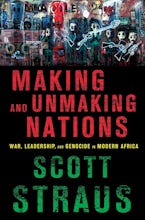Genocide studies do not make for fun reading. Scott Straus's latest book might not violate this rule, but it bends it. This is an exciting, erudite, thought-provoking, and highly readable book. It engages with the highest levels of scholarship on genocide and African politics while remaining largely accessible to general readers, and it offers a new comparative theory of genocide that is both illuminating and intuitively appealing.
~Pierre Englebert, Pomona College, Political Science Quarterly
It is clear that Straus is interested in honestly exploring why genocides occur—and do not occur—rather than selecting favorable cases to promote a preconceived policy or theoretical agenda.... In the final analysis, this is a great book for anyone interested in studying genocide, state formation in Africa, the power-of-elite narrative, and policy responses to genocide.
~Dan G. Cox, Miltary Review
Scott Straus has written an extremely important book, arguing that genocide has crucial ideological foundations, but that these conditions only lead to genocide when situational incentives drive a process of escalation. This contribution highlights the central role of ideas as a cause of genocide, while also outlining forces of restraint that can hold mass categorical violence at bay. Anyone interested in political violence must engage with this book.... Making and Unmaking Nations is a major achievement. Not only does it help us better understand the ever-vexing question of genocide, but it also identifies key open questions for future research and offers a set of useful policy diagnostics and prescriptions. As the prospect of mass killing looms over ongoing conflicts in the Middle East, Africa, and Asia, this is a particularly timely and important work.
~Paul Staniland, Perspectives on Politics
Straus' previous book was a penetrating analysis of the 1994 genocide in Rwanda. Here, he returns to the issue of large-scale ethnic violence in Africa, demonstrating an impressive command of the historical material to contrast the cases of Rwanda and Sudan, where genocides took place, with three cases in which ethnic conflict did not reach that point (Côte d'Ivoire, Mali, and Senegal). In the end, he concludes, whether interethnic strife results in genocide depends almost entirely on national leadership.
~Nicolas van de Walle, Foreign Affairs
The originality of Straus's study lies in his focus on the intersection of local and national actors in their approach to ideas such as nationalism, violence and power....Making and Unmaking Nations is an original and interesting book.
~Caroline Varin, International Affairs
A challenging read for its topic and nuance, [Making and Unmaking Nations] is nonetheless an important one for those interested in understanding how genocides come about and how genocidal impulses can be restrained.
~Alex Alvarez, Northern Arizona University, Holocaust and Genocide Studies
